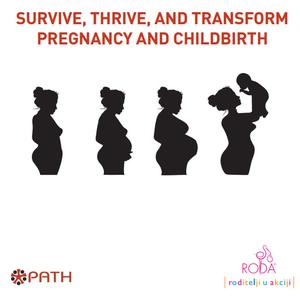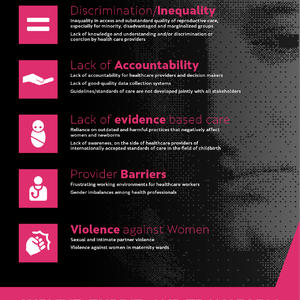Eastern Europe and Central Asia Caucus
Reproductive Health Issues that Impact Women during Pregnancy, Childbirth and Postpartum
In preparation for the caucus we consulted individuals and organizations from the region to identify the most pressing reproductive rights concerns in their countries. We compiled the following list, which is non-exclusive, but is an attempt to highlight the priorities for the region in terms of reproductive health issues which impact women especially in pregnancy, childbirth and postpartum. We hope that with your help during the caucus we can propose a strategy to address these issues on a regional level.
1. Gender Stereotyping – Women Perceived as not Competent to Make Decisions about Their Bodies and Their Babies
- Lack of respect for reproductive health choices throughout a woman´s lifecycle that negatively impacts her right to decide freely and responsibly on the number and spacing of her children. Includes: lack of respect for the right to access abortion and contraception ; forced abortions due to fetus defects or preterm birth.
- Lack of respect for the right to informed decision-making: including the lack of understanding by health professionals of the basic principle that decisions connected to reproductive healthcare (and to all other healthcare) are ultimately taken by the clients and beneficiaries of the care and not by health personnel.
- Disrespect, abuse and other violations of rights in reproductive healthcare settings, be it psychological, verbal or physical (including shaming and social stigma regarding "bad" choices)
- Harmful stereotypes about women, including the stereotype of a woman as a mother and as an incompetent decision-maker that contribute to violations of sexual and reproductive rights of women and girls, including in childbirth; social security systems and employment and social policies that perpetuate the roles of women as mothers and hinder women from a balanced exercise of their parental responsibilities and paid work
- Lack of assisted reproductive care. Includes: insurance companies' limitations on how many couples per year can have treatment or how many cycles a couple (or woman) can go through; limitations to extent of coverage of treatment.
2. Access to Information and Education
- Lack of awareness and access to information about reproductive health: including lack of formal or informal information dissemination about reproductive health, contraception, abortion, pregnancy, birth and postpartum, especially among youth; religious influence on the content of sexuality education classes; lack of open discussions of menstruation; lack of education of health professionals and policy makers on reproductive health.
3. Discrimination/Inequality
- Inequality in access to reproductive health services, including maternity care, for minority, disadvantaged and marginalized groups (including: rural, poor, ethnic minorities (including Roma), migrant women or transgender women.).
- Substandard quality of reproductive care provided to minority, disadvantaged and marginalized groups as compared to majoritarian population.
- Restrictions on access to assisted reproduction for disadvantaged groups: same-sex couples; women living without a male partner; minority women and women with disabilities.
- Lack of knowledge and understanding and/or discrimination or coercion by health care providers against minority, disadvantaged or marginalized groups seeking sexual and reproductive services including lesbians, people with disabilities, transgender people, ethnic and religious minorities.
- Lack of holistic care that meets the needs of people with disabilities, or sicknesses requiring specific approaches to sexual and reproductive healthcare.
- Forced sterilizations and/or forced contraception, particularly of ethnic or religious minorities, disadvantaged and marginalized populations (e.g. Roma women, women with disabilities, transgender people)
4. Lack of Accountability
- Lack of accountability for healthcare providers and decision makers; lack of mechanisms and procedures providing adequate remedies and systemic improvements to the functioning of health care facilities, practitioners and systems.
- Lack of channels and procedures for gaining meaningful feedback from mothers/families to providers in person or in writing (particularly focusing on general treatment and respect)
- Fees for service in the field of childbirth: including, out-of-pocket or informal payments that have to be made to doctors, midwives or health care facilities; fees for a companion at birth; fees for epidurals.
- Lack of good-quality data collection systems: including for information on mortality, caesarean, episiotomy, all labour and delivery practices including interventions , abortion rates, unmet need for contraception etc.; also lack of gender, ethnicity, disability, sex orientation and age aggregated data on SRHR indicators
- Poor political support for reproductive health including pregnancy, childbirth and postpartum care and lack of financing. Lack of gender sensitive approaches to public budgeting.
- Guidelines/standards of care are not developed jointly with all stakeholders, including the potential beneficiaries of care and their advocates or representatives.
5. Lack of evidence based care
- Lack of evidence-based protocols for handling pregnancy, birth and postpartum (e.g. no continuity of care during pregnancy; lack of homebirth protocols); and lack of awareness, on the side of healthcare providers of internationally accepted standards of care in the field of childbirth, reliance on outdated and harmful practices that negatively affect women and newborns
- Lack of parenting support and access to the newborn after birth. Includes: Lack of continuous contact with the newborn after birth ; lack of access to a sick newborn; and lack of support and empowerment focused on the exercise of confident parenting (e. g. lack of support in breastfeeding).
- Lack of choice of provider (midwife or doctor) and/or place for birth (birth center, hospital or home birth)
- Lack of awareness of psychological impacts of childbirth, including of birth trauma and ways to address it
6. Provider Barriers
- Frustrating working environments for providers of care, lack of respect for and fulfillment of their personal and professional needs and rights connected to exercising an occupation
- Gender imbalances among health professionals providing care in childbirth and designing systems of care in childbirth
7. Violence against Women
- Violence against women, including sexual violence and intimate partner violence and its interconnections with and impacts on the sexual and reproductive rights of women, including in connection with pregnancy, birth and postpartum (lack of awareness, lack of data, lack of appropriate systems of interventions) .

 73.17 kB 28
73.17 kB 28

 356.04 kB 61
356.04 kB 61